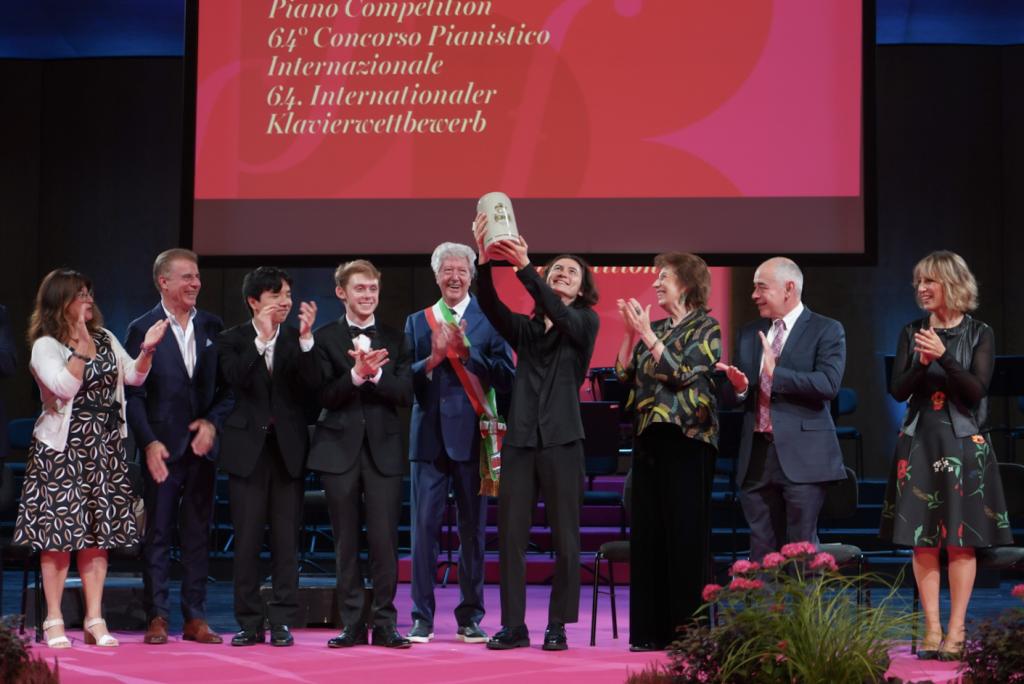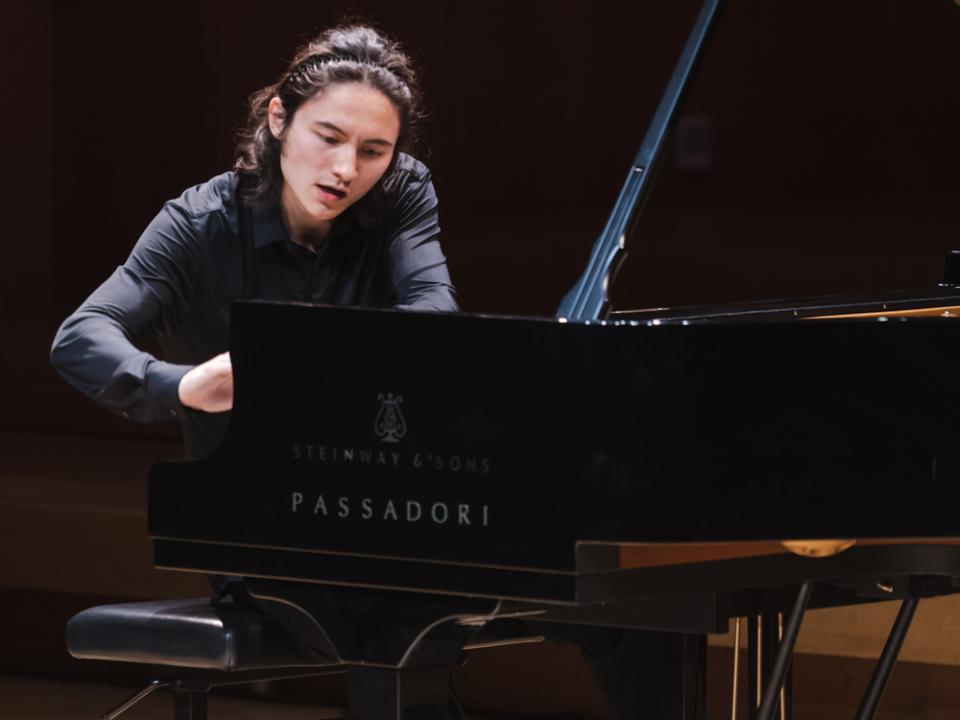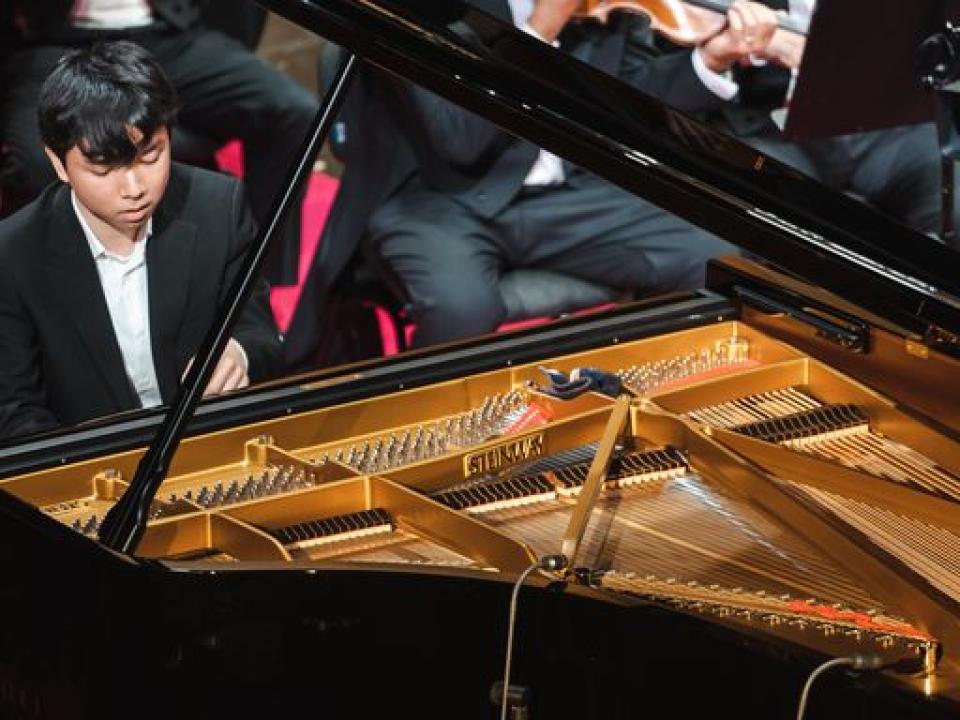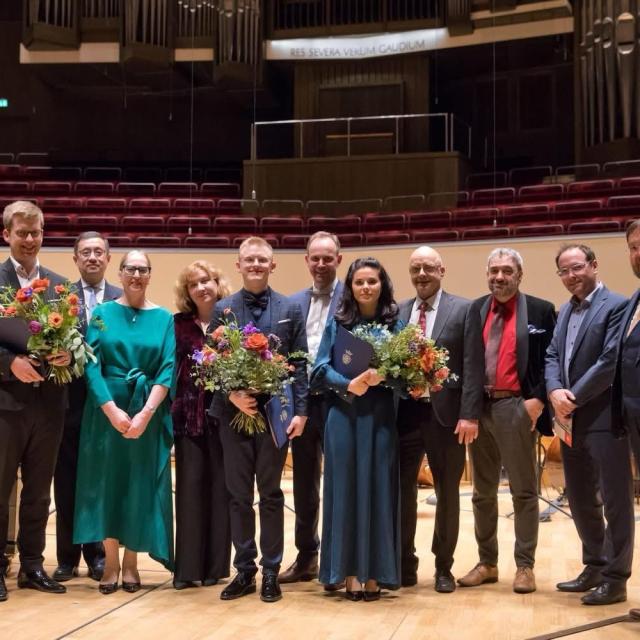Arsenii Mun wins the 2023 Busoni Competition

Unanimous jury decision means Mun will also win the Michelangeli Prize, which has not been given in 15 years
At the end of the final stages of the 64th International Ferruccio Busoni Piano competition, the international jury headed by Ingrid Fliter awarded the "Busoni Prize", the First Prize of the Competition, to Arsenii Mun for his outstanding interpretation of Rachmaninovs Paganini-Rhapsody. The 2nd Prize went to Anthony Ratinov; Ryota Yamazaki was awarded the 3rd Prize.
Arsenii Mun also won the Arturo Benedetti Michelangeli Prize, which is only awarded to the first prize winner in the event of a unanimous jury decision. The prize had not been awarded in over 15 years.
The Orchestra Final was broadcast live by Italian TV Rai Alto Adige, Rai Radio 3 and Rai Südtirol as well as South Korea's KBS, Amadeus.tv in China, and Stage+, the new classical music streaming platform by Deutsche Grammophon.
From 2010 to 2019 Arsenii Mun studied at St. Petersburg State Conservatory with Prof. Alexander Sandler. He now continues his education in the Juilliard School of Music in New York with Sergei Babayan who says: "I met Arsenii first when he was about 15 or 16 years old, when he participated in the Verbier Festival academy. The average age there is about 22, so he was notably the youngest. And that year he was awarded the Tabor Foundation Prize, which is given to the most promising student of the Verbier Festival Academy.
I was teaching master classes that year and immediately knew that Arsenii Mun was the most interesting participant, because at his very young age he already could do many things intuitively. His Chopin Mazurkas had something very special. One needs a special gift to feel that special atmosphere of the Mazurkas. This is not something one can teach. A teacher might help to develop and deepen those qualities, discuss colors and rubato, but one cannot instill the mazurka spirit. But ultimately, you are either born with it or not.
Arsenii had this gift already at a very young age and I had a feeling that those exceptional, delicate quality of colors might later develop into something very interesting. I very clearly remember those Mazurkas. They were very important in my decision to take him to my studio, years later when he played for me again. Eventually he became my student at Juilliard School - that's our story."
Mun has won prizes in many major competitions, such as first prize at the Horowitz Competition in Ukraine, second prize at the Cliburn Junior Competition in the USA, first prize at the Artur Rubinstein in Memoriam competition in Poland, and first prize in the St. Priest competition in France. He also received the “Verbier Festival” Tabor piano award. He has performed with such conductors as Valery Gergiev, Mei-Ann Chen, Stanislav Kochanovsky, Mark Russell Smith and Ian Hobson.
Winners
First Prize Arsenii Mun
Second Prize Anthony Ratinov
Third Prize Ryota Yamazaki
Jury
Ingrid Fliter (Chair), Iain Burnside, Jiang Chen, Imogen Cooper, Fulvia de Colle, François -Frédéric Guy, Aleksandar Madžar, Clemens Trautmann
The Ferruccio Busoni International Piano Competition was launched on 12 September 1949. It immediately captured the attention of the contemporary music scene, due in part to the presence of an extraordinary Honorary Committee, which included Claudio Arrau, Wilhelm Backhaus, Alfred Cortot, Walther Gieseking, Dinu Lipatti, Arthur Rubinstein and Arturo Benedetti Michelangeli, who made a considerable sum of money available for second prize. From a one-off competition, it would soon become an indispensable annual event.
In that first competition of 1949, the just-18 Alfred Brendel earned an honorable fourth prize. In 1952 the Busoni Prize (which at the time consisted of a sum of 500,000 lire, 15 concerts and a Schulze & Pollmann grand piano) was awarded to the Roman pianist Sergio Perticaroli. In 1956, First Prize was awarded to Jörg Demus; the following year it went the extraordinary sixteen-year-old Martha Argerich. A piano-composition competition also took place in some years: the performance of fourteen-year-old Maurizio Pollini aroused amazement in 1956, when he replaced Giorgio Vidusso in the difficult task of performing the works chosen by the jury at the very last moment.
In the 1960s, European pianism opened up to the U.S. school with First Prize going to Jerome Rose (1961), Michael Ponti (1964), Garrick Ohlsson and Richard Goode (First and Second Prize, respectively, in 1966), Ursula Oppens (1969). In the 1970s the First Prize of Brazilian Arnaldo Cohen (1972) stands out, while in the eighties Louis Lortie (1984) and Lilja Zilbernstein (1987) were unanimously awarded First Prizes, which launched great careers. The Russian school dominated the 1990s, with wins by Anna Kravtchenko (1992), Alexander Shtarkman (1995) and Alexander Kobrin (1999). In 2002 the competition changed structure, inaugurating its biennial structure. With the last Busoni Prize awarded to Emanuil Ivanov (2019/2020) the next Grand Prize that will enrich our Hall of Fame is awaited with baited breath.
©WFIMC 2023







